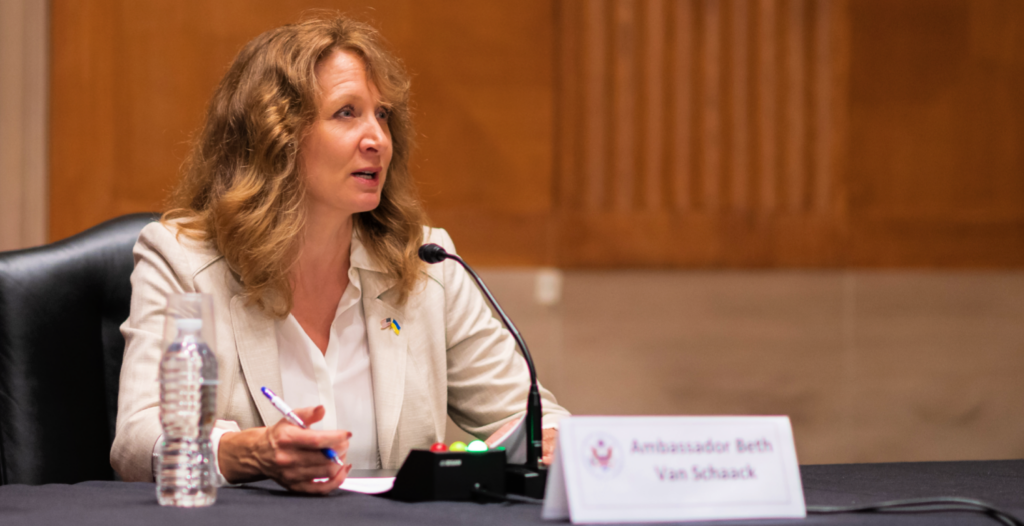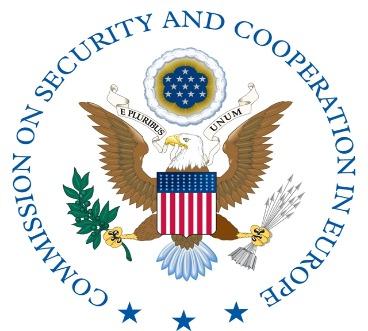WASHINGTON – Today, Congressman Alcee L. Hastings (D-FL), Chairman of the Commission on Security and Cooperation in Europe (U.S. Helsinki Commission), and Co-Chairman Senator Benjamin L. Cardin (D-MD), made the following statements at a hearing held by the U.S. Helsinki Commission entitled “Guantanamo: Implications for U.S. Human Rights Leadership.” The hearing focused on the international perspective of Guantanamo, particularly in the 56 participating States of the Organization for Security and Cooperation in Europe (OSCE) and the implications for U.S. leadership on human rights issues.
Testimony was received from Mr. John B. Bellinger III, Legal Adviser, Department of State; Senator Anne-Marie Lizin, President of the Belgian Senate and the OSCE Parliamentary Assembly Special Representative on Guantanamo who has just visited Guantanamo; Mr. Tom Malinowski, Advocacy Director, Human Rights Watch; and Mr. Gabor Rona, International Legal Director, Human Rights First. In addition, testimony was received for the record from the International Helsinki Federation. Majority Leader Steny H. Hoyer also addressed the hearing. Copies of all the statements and an unofficial transcript will be posted on the Commission’s website.
During the hearing, Congressman Hastings and Senator Cardin were critical of the United States detainee policies at Guantanamo and expressed deep concern about the indefinite detention of individuals for the duration of a conflict that has no foreseeable end in sight. They called for the Guantanamo facility to be closed and detainees to be transferred to the United States for trial, or to be released as appropriate. Please find their statements below:
Statement from Congressman Alcee L. Hastings –
“This is the Helsinki Commission’s first hearing in some time examining an issue of domestic compliance, an area which will receive warranted attention during my Chairmanship. As many people here know, in executing the Helsinki Commission’s mandate, Members of this Commission are engaged in a continual dialogue with representatives of other countries – including parliamentarians – on issues of concern, with a particular focus on human rights. This is, of course, a two-way street. Just as we raise issues of concern with representatives of other countries, our colleagues raise issues with us. And no issue has been raised with us more vigorously and vocally than questions relating to the status and treatment of detainees, particularly those at the Guantánamo Bay detention facility. These concerns have been raised for several years at meetings of the OSCE Parliamentary Assembly, they have been raised at meetings of the OSCE permanent Council in Vienna, and they have been raised at the human dimension meetings of the OSCE.
“I believe very strongly that our colleagues who have raised concerns with us deserve our considered response and engagement. The fact is, for all the 56 OSCE participating States – and not just the United States – the issue of how to safeguard human rights while effectively countering terrorism may be one of the most critical issues our countries will face for the foreseeable future.
“In organizing this hearing, it is painfully difficult to un-package a whole set of issues related to our counterterrorism efforts: the offshore detention center at Guantánamo; the treatment of detainees in custody and the interrogation practices to which they may be subjected; the legal procedures for holding, trying and (potentially) convicting detainees of crimes; and the issue of extraordinary rendition to name a few. Frankly, the United States has not covered itself with glory when it comes to any of these issues.
“I am, of course, mindful of the fact that many other committees of both the House and the Senate are actively engaged in oversight on many aspects of this subject. It is not our intention to duplicate those efforts. Rather, we hope to address the specific implications of Guantánamo for U.S. human rights leadership. In no small understatement, this year’s State Department Country Report on Human Rights notes: ‘We recognize that we are writing this report at a time when our own record, and actions we have taken to respond to the terrorist attacks against us, have been questioned.’
“Most importantly, we’ve got to figure out where we go from here. Pretty much everybody and his brother, including the Secretary of Defense and the Secretary of State, have said that Guantanamo ought to be closed down – either because they believe it never should have been opened to begin with, or because they’ve concluded that the stigma associated with Guantanamo is so great that the entire operation serves to undermine our alliances and strengthen the propaganda machinery of our enemies, rather than make us safer.
“But the question is, where do we go from here? I am hoping our hearing today will help us answer that question.
“In closing, I would like to note that on May 15, we sent a letter to Secretary Gates inviting the Department of Defense to send a witness to this hearing. The Department has declined the opportunity to have its views heard. I am frankly quite disappointed by the message this sends. I know some tough questions may come up today, but it seems to me that there is nothing to be gained by ducking them,” said Congressman Hastings.
Statement from Senator Benjamin L. Cardin –
“The credibility of the United States demands that we answer our critics when they raise human-right issues with us, just as we hope representatives of other countries will respond seriously and substantively when we raise concerns with them.
“The fact is, in all the years that I have served as a member of the Helsinki Commission, there is no other concern that has been raised with the United States by our colleagues in Europe as often – and in earnest – as the situation in Guantánamo. As a member of the U.S. Delegation to meetings of the OSCE Parliamentary Assembly, this has been a subject of constant debate.
“Of course, when Belarus introduces resolutions at the United Nations bashing the United States for Guantanamo and a litany of other alleged human rights violations, we can dismiss this as a classic piece of self-serving, Soviet-style propaganda. But we cannot be so cavalier when Switzerland, a guardian of humanitarian law, expresses concern at the OSCE Permanent Council regarding U.S. practices and policies. And when Vladimir Putin can get crowds cheering by bemoaning the lack of proper trials at GTMO, there is something terribly wrong with this picture.
“The damage done to the United States goes beyond undermining our status as a global leader on human rights. Our policies and practices regarding Guantanamo and other aspects of our detainee policies have undermined our authority to engage in the effective counter-terrorism measures that are necessary for the very security of this country. As Gijs de Vries of the Netherlands, who stepped down in March from his position as the EU’s first counter-terrorism coordinator, recently observed: ‘The United States used to be known as a country of the rule of law and of liberty. Today, it’s associated with Abu Ghraib, with Guantanamo, and with CIA renditions to secret prisons in blatant violation of international law. That is sapping support for the United States, and indirectly also for Europe worldwide.’
“This view was echoed by former National Security Advisor Brent Scrowcroft, who stated ‘that the international community no longer trusts our motives is a new phenomenon, and I see it as one of many warning signs of a possible lasting realignment of global power. [ . . . ] I don’t think were there yet, but it’s certainly possible that we’ve created such a menace, and alienated so much of the world that we can never go back to where we were at the end of the Cold War. At that time, the United States was considered the indispensable ingredient in any attempt to make the world better.’ Or, as Phillip Zelikow, a former Bush administration official recently argued, ‘Sliding into habits of growing non-cooperation and alienation is not just a problem of world opinion. It will eventually interfere – and interfere very concretely – with the conduct of worldwide operations.’ This is not just a sad or even tragic commentary on how fast and how far we’ve fallen in the eyes of the world, it is dangerous for our citizens if we cannot build and maintain effective global alliances
“To be clear, I do not mean to suggest that America should hold its finger to the wind of international opinion and make policy accordingly. The fact is, sometimes being a global leader means bearing the burden of persuasion, the burden of bringing other countries around to our position. In fact, there have been many times when the United States has been almost a lone voice on critical human-rights issues. When our policies are just ones, then that is a burden we should be prepared to carry. But I think the question here is: are our underlying policies upholding the rule of law or attempting to circumvent it? Are our positions really defensible at home and abroad?” asked Senator Cardin.






